Michael Alexis is the CEO and owner of TeamBuilding, a virtual event company.
When the pandemic hit, Michael’s in-person museum tour business (Museum Hack) plummeted from $2.8 million per year to zero. Michael and his partner Tasia Duske pivoted by building up virtual team-building offerings. In one year, the company scaled to over 100 employees and amassed over 20,000 five-star reviews.
What were the top 3 mistakes you made as an entrepreneur, and if you could start over what would you do differently?
One of the biggest lessons I’ve learned about building startups is some waste is normal and expected.
As an early entrepreneur, I struggled to invest in my businesses. I would have an idea, then try to make it come alive while keeping costs at an absolute minimum. I was so afraid of wasting money, that I never really got anything off the ground. Then, I started making meaningful investments — some of which took months or even years to develop. Not every investment is a home run, but the wins outweigh the misses. Now, my tolerance for spending, and risk tolerance are much higher — and that shift has helped me build a 100+ person company.
When we pivoted to a virtual event model, we were too ambitious in our initial offerings.
A major learning moment for TeamBuilding was realizing that we had divided our resources too quickly.
The company had multiple domains and websites that we would eventually concentrate on one. For example, an early idea was to build a flexible-membership service called Petri, which would consist of the ability to mix-and-match services across our different trademarks from one central account. However, without a strong foundational brand identity and long-standing customer relationships, marketing this option was a heavy lift. We realized that instead of simultaneously building multiple businesses, it was more prudent to focus on perfecting one. Eventually, we merged our ideas into a single domain. Similarly, when the pandemic hit, we put Museum Hack into hibernation and focused our efforts on TeamBuilding instead of splitting our energy, attention, and capital between divergent ventures.
My advice and recommendation to other entrepreneurs is simple: when you are first starting out, build one business, not three.
Michael Alexis CEO of TeamBuilding
Top 3 Business Mistakes: Jonathan Lautermilch Founder of Smart Shark








